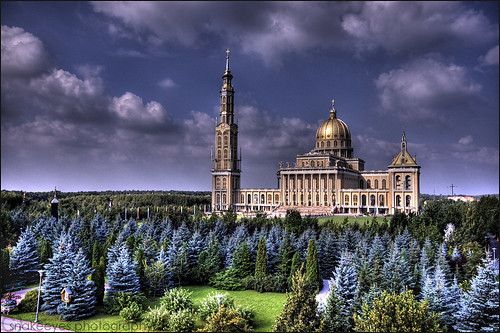Religion in Poland Posted by Kasia on Mar 9, 2013 in Religion
Throughout the history of the Polish State, the Roman Catholic Church has played a very important role. Because of the Roman Catholic Church, Poland was able to continue its existence in history. The decision of choosing Roman Catholicism as Poland’s first and only religion under the auspices of the Church in the Czech Republic, as opposed to coming under the authority of the Church hierarchy in Germany, allowed Poland to keep its independence and later play an important role in Central Europe. Poland then recognized Saint Peter as its first patron saint. At various times, when the country was in danger from foreign powers, the Polish people appealed to this religion as their saving agent, uniting the whole nation. It helped the Polish nation survive even when the Polish State disappeared from the map.
Until the 16th century, Polish culture developed according to the Church’s needs. There were no secular paintings, and the majority of Polish literature was created for the Church and was mainly written by clergy. Monks and priests were the only educated people in those times.
During the partition of Poland, in the 19th century, it was religion that helped to maintain the hope that independence would be gained again. After the Second World War, the Roman Catholic Church remained the only alternative organization to the Communist Party and the political opposition against the Communists was organized around the Church. At that time, the Catholic Church was in a state of permanent conflict with the government.
The Roman Catholic Church continues to hold a very strong position in Poland. It is one of the richest social organizations, owns schools, publishing agencies and other companies. It also tries to play an important role in the political life of the country. A lot of new political parties Catholic or Christian by name and ideology have been created during the last five years. Also the Catholic Church itself and its dignitaries often take the floor in the matter of politics, trying to influence voters and politicians. In the same way, there is active participation and leadership in the government by political parties, which do not have strong ties to the Church. The current president of Poland is a member of such a party, and a partner in the governing coalition is a political party without formal ties to the Church.
The Church remains an important social institution, especially in the rural areas and in small towns, where many parish cultural and sport organizations function. In addition to the Roman Catholic Church, other Catholic Churches in Poland include Greek Catholic, Armenian, and Old Catholic Churches.
Today, when freedom to confess a religion is constitutionally assured, there are a lot of different Churches in Poland, mainly Christian denominations. The largest and most important is Catholicism, which is confessed by, according to official data, more than 35 million people, or about 95% of the population.
The second largest church in Poland, in size and importance, is the Polish Orthodox Church. It counts more than 500,000 followers, mainly in the eastern regions of Poland. The Orthodox Church in Poland was persecuted and discriminated against for many years to a much greater degree than the Roman Catholic Church. Now, after the fall of Communism, Orthodox Christians can without fear confess their faith and rebuild places of worship which had been destroyed in the last 50 years.
Protestant Churches are also numerous in Poland. The largest are the Augsburg-Evangelical and Pentecostals (each has about 100,000 members) followed by the Baptists, Adventists, Methodists and ending with the smallest, the Christian Congregation and Evangelical Congregation ‘Zion,’ each with 20 members.
Moslem and Krishna confessors number about 5,000 members each. And there are only a few practicing Jews left in Poland; the Association of Jewish Religious Communities in the Republic of Poland has only 1,222 members. After the German occupation during World War II and the systematic extermination of Jews, only about 300,000 Jews survived in Poland. There had been more than 3.5 million Jews living in Poland before 1939. Shortly after the end of the war, 290,000 emigrated from Poland to Israel.
Do następnego razu… (Till next time…)

Build vocabulary, practice pronunciation, and more with Transparent Language Online. Available anytime, anywhere, on any device.
About the Author: Kasia
My name is Kasia Scontsas. I grew near Lublin, Poland and moved to Warsaw to study International Business. I have passion for languages: any languages! Currently I live in New Hampshire. I enjoy skiing, kayaking, biking and paddle boarding. My husband speaks a little Polish, but our daughters are fluent in it! I wanted to make sure that they can communicate with their Polish relatives in our native language. Teaching them Polish since they were born was the best thing I could have given them! I have been writing about learning Polish language and culture for Transparent Language’s Polish Blog since 2010.





Comments:
Tera:
I am wondering if there are more Jews now in Poland. I have heard of a Jewish Cultural Festival that takes place in Krakow and Kazimierz. It supposedly has 30,000 attendees. My husband and I and are children are Jewish and my husband’s family is originally from Poland. We would like to see Poland as we have never been. We are trying to learn the language. I am just worried how it would be for us? We have been even trying to figure out how we could spend some time in Poland. Please let me know your thoughts.